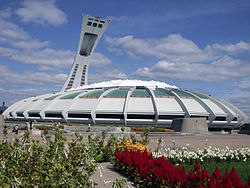| Tournament details | |
|---|---|
| Host country | Canada |
| Dates | 18–31 July 1976 |
| Teams | 13 (from 4 confederations) |
| Venue | 4 (in 4 host cities) |
| Final positions | |
| Champions | |
| Runners-up | |
| Third place | |
| Fourth place | |
| Tournament statistics | |
| Matches played | 23 |
| Goals scored | 66 (2.87 per match) |
| Attendance | 597,574 (25,981 per match) |
| Top scorer | |
← 1972 1980 → | |
The football tournament at the 1976 Summer Olympics started on 18 July and ended on 31 July. Only one event, the men's tournament, was contested. 13 teams participated in the tournament, while three African teams withdrew in support of the anti-racism boycott. [1] East Germany won the gold, defeating Poland in the final, with the Soviet Union taking the bronze.



